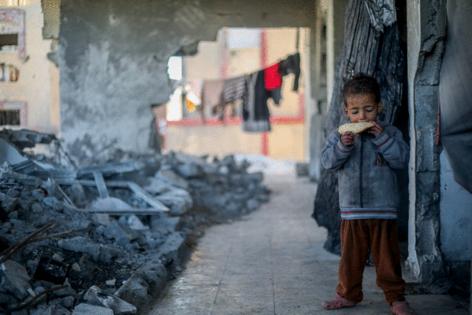Commentary: Israel and the Jewish diaspora should be leaders in rebuilding Gaza
Published in Op Eds
What often follows devastating armed conflict are silence, amnesia and a desire to return to the status quo ante bellum. The more powerful party has little incentive to engage in reconstruction, contrition or negotiation about a political settlement.
Alternatively, a more aggressive model of justice demands that the losing side be held to account in a legal proceeding. This model of retribution, which has deep biblical roots, is an animating principle of the current international legal order. Its advocates might point out that it can deliver justice by punishing those who committed heinous crimes.
This indeed was the premise of the Nuremberg trials of 1945-46 in which the political and military leaders of Nazi Germany met their fate in an extraordinary legal setting. But the retributive model has serious liabilities as well. It embodies the principle of victor’s justice in which the culpability of the winning side is never questioned (and which betrays a decidedly Western bias, given that the overwhelming majority of those convicted in international legal courts are African).
These questions arise urgently in the wake of the Israel-Hamas war in Gaza. What does justice look like there? The recent return of the hostages introduces a new degree of normality into Israeli society, allowing it to release the collective breath that it has held since Oct. 7, 2023. And yet, Gaza lies in ruins. Towns and cities are razed to the ground, thousands upon thousands are homeless, and the final death toll is still being tallied as bodies are being removed from the rubble.
Silence and amnesia simply won’t do. One cannot and must not ignore the state of devastation. It would be a total moral abdication.
But the retributive model of justice may not be the optimal path to follow. This was the route of the International Criminal Court when it issued indictments against Israeli Prime Minister Benjamin Netanyahu and Defense Minister Yoav Gallant, as well as Hamas leaders Yahya Sinwar, Mohammed Deif and Ismail Haniyeh last November. It is understandable why the international legal system would proceed against these two groups of leaders. There is sufficient evidence to charge all of them with major war crimes.
So why not demand that the Israeli and Hamas leaders be called to answer for their crimes? There is a pragmatic response. All of the indicted Hamas leaders are dead, and the Israeli leaders operate within a web of Western and specifically American impunity. They will not be compelled to make their way to the Hague.
But there is another way to look at the question of accountability. Legal retribution is a highly imperfect means of attaining justice. This point has been made clearly by Mahmood Mamdani, the distinguished political theorist (and father of New York City mayoral candidate Zohran Mamdani). In his book “Neither Settler nor Native,” he offers a critique of the classic example of retributive justice, Nuremberg. He argues that, in fact, Nuremberg entailed a number of major miscarriages of justice: It reinforced a regime of winners and losers, did little to repatriate Jews to their homes in Europe, and, in indirect fashion, imposed new burdens on a people (Palestinians) not responsible for the crimes for Nazism.
Mamdani’s provocative suggestions invite us to consider alternatives to the path of legal retribution. For example, the model of reparation. Gaza cries out for repair, in material, economic, political and moral terms. With the return of the hostages, it is necessary for Israelis — and strong supporters of the state of Israel — to step out of the web of trauma, grief and rage in which they have been located since 2023 to recognize the full scale of the destruction wrought by the Israeli army on Gazans. This will be hard.
The task would be made easier if there were some meaningful expression of contrition by those responsible for the initial attack against Israel. But we can’t wait for that moment. The time has come for Israelis to recognize that they are the much stronger party — and that their own privilege has entailed the Palestinians’ misfortune since 1948. Above all, they must confront, acknowledge and apologize for the devastation that their army, on the orders of their political and military leaders, has wrought on Gaza.
Words are necessary but not sufficient for reparation. As various countries in the regime prepare to engage in the massive work of reconstructing Gaza, Israel cannot be absent from this project. Nor, for that matter, can Jews worldwide who have been supportive of Israel for decades. It is a matter of ethical obligation for them to sign onto this massive economic undertaking; but it is also an investment in a better life for all who live between the river and the sea.
Almost two years ago, I called for a Marshall Plan for Gaza. The need has become exponentially greater today. The return of the hostages and a pause in the killing and destruction have opened a narrow window of opportunity. The world cannot tarry in getting a peacekeeping force on the ground and commencing the massive work of reconstruction. Israel and the many Jews who support it should mobilize their resources and commit to the idea of a Marshall Plan. It will be an essential act of moral and economic reparation that can go a long way toward building a viable future for and with Palestinians.
____
David N. Myers teaches Jewish history at UCLA.
_____
©2025 Los Angeles Times. Visit at latimes.com. Distributed by Tribune Content Agency, LLC.
























































Comments